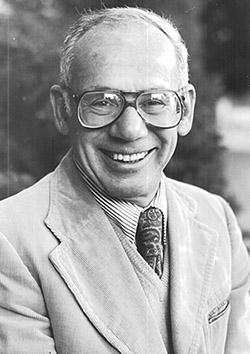
Tom Tugend
Some 72 years after he fought with an American unit that helped liberate France during World War II, journalist Tom Tugend has received France’s highest civilian honor.
Tugend and nine other veterans were honored in a ceremony on March 9. Tugend was appointed as Chevalier (Knight) in the National Order of the Legion of Honor for his service in the U.S. infantry in Alsace, attached to the 1st French Army in its fight against Germany.
The whole process of knighthood took about a year, Tugend said. A retired air force colonel told him that the French government wanted to honor American soldiers who fought to liberate France, so Tugend sent in paperwork and waited months to find out if he had been approved.
The ceremony was especially meaningful because most of the men there were enlisted men, Tugend said, himself discharged as a sergeant. He received a letter from French President François Hollande thanking him for putting his life on the line.
He also received a letter of congratulations from Steven Spielberg.
“The letter said ‘I received the award some years ago and it meant a lot to me, and I know it will mean a lot to you,’” Tugend said. The Legion of Honor is also given to artists, writers and scientists.
Tugend and Spielberg go way back. A longtime writer and journalist, Tugend interviewed Spielberg before the release of Schindler’s List and was one of the first to report on Spielberg’s project to record video testimonies of Holocaust survivors.
Over the last 20 years, Tugend has written many stories abut USC Shoah Foundation, including the founding of the Center for Advanced Genocide Research, the launch of IWitness and Arnold Spielberg receiving the Institute’s Inspiration Award in 2012.
This soldier wrote all about @USCShoahFdn before giving testimony himself.
Tugend has written for the Los Angeles Times, San Francisco Chronicle, Associated Press, Jewish Journal of Greater Los Angeles, Jerusalem Post in Israel, Jewish Chronicle in Britain, and the Jewish Telegraphic Agency, among other outlets. He also worked for 30 years as a science writer and communications director at UCLA.
In his initial conversation with Spielberg, Tugend said the director mentioned that Tugend should give a testimony himself. Born in Berlin, Tugend and his family fled Germany for the United States in 1939 following Kristallnacht and the creation of anti-Jewish laws that endangered the family’s livelihood and safety.
Though he doesn’t usually consider himself a Holocaust survivor, Tugend agreed to give his testimony.
“I figured it would be a great way to leave a legacy for my kids – [to see me] for two hours talking about my life and family,” he said.
After covering USC Shoah Foundation since before it even officially began, Tugend said it’s amazing to see how much it’s grown.
“I’m still flabbergasted by the fact that the Shoah Foundation could get 52,000 testimonies. And I saw it from the very beginning,” Tugend said. “It’s something I wish had existed throughout history.”
At 90, Tugend is just as busy as ever. He still writes at least one story a week for the Jewish Journal and other publications because, he said, “I’ve never found writing to be easy if you take it seriously; you always have to work at it.”
As for the Legion of Honor, he might still have some explaining to do.
“When I told my youngest grandson that I had been named a knight, he said to make sure I get the horse and lance and give it to him for his birthday,” Tugend laughed. “He was bitterly disappointed.”